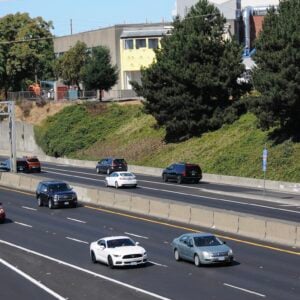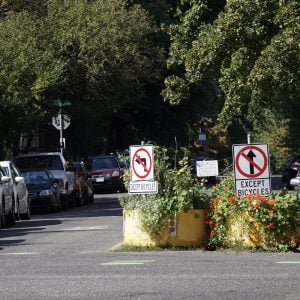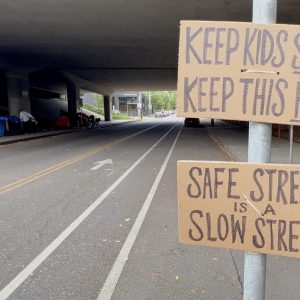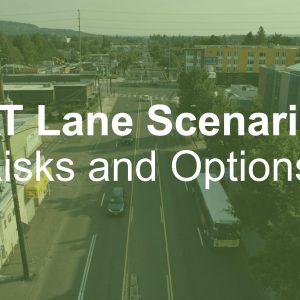“…if our only answer is highway expansion and not a multi-modal solution, then we are taking a step backward on global warming.”
–Gov. Ted Kulongoski
A few weeks ago, I pointed out that Oregon Governor Ted Kulongoski’s “State of the State” address forgot to mention bicycles when the topics of of our aging transportation infrastructure, congestion, and global warming came up.
But on Friday, Kulongoski made up for that omission in a speech to the Oregon Environmental Council where he laid out his transportation priorities for the 2009 legislative session.
In a wide-ranging address with several mentions of bicycles, reducing vehicle miles traveled (VMT), transit, and even congestion pricing (!), he said he wanted the 2009 transportation plan to be “the largest, most strategic and greenest plan in Oregon history.”
His words will no doubt provide even more leverage for bike, transportation, and environmental advocates during their lobbying work in Salem this year. One local bike advocate attended Friday’s speech, and was so excited by what he had heard he called me immediately to share the news.
I’ve pasted some of the choice passages from his speech below.
In explaining how Oregon might reduce the all-important vehicle miles traveled (VMT) rate, he offered support for a bike commuter tax benefit:
“…we could expand our existing tax credits to businesses that encourage telecommuting, carpooling, biking and the use of public transportation.”
And his mention of congestion pricing as “simple supply and demand economics” has gotten a lot of media attention:
“…perhaps the most significant thing we can do is introduce performance-based pricing into our highway system. This is sometimes called congestion pricing.”
He said that our transportation infrastructure is “woefully outdated” and that;
“…we need to modernize, repair and maintain the current structures as well as provide Oregonians with transportation choices, including public transit, pedestrian walkways and bicycles.”
It’s great to see that bikes have made their way into the Governor’s language. I know that after leaving bikes out of his State of the State address he got a few phone calls from folks who were just as miffed as I was. And of course, he just returned from a trip to Amsterdam, where bikes surely left an impression on him.
Given this tough talk, it will be interesting to see how he does the political dance around the controversial Columbia River Crossing project — which will loom large over any talk of transportation next session.
In his speech Friday, Kulongoski said, “if our only answer is highway expansion and not a multi-modal solution, then we are taking a step backward on global warming.”
Speeches are one thing, but changing an entire bureaucracy which has an institutionalized bias against human-powered vehicles, is another indeed.
You can read the entire address here.








Thanks for reading.
BikePortland has served this community with independent community journalism since 2005. We rely on subscriptions from readers like you to survive. Your financial support is vital in keeping this valuable resource alive and well.
Please subscribe today to strengthen and expand our work.
“…we could expand our existing tax credits to businesses that encourage telecommuting, carpooling, biking and the use of public transportation.”
So businesses are getting a tax credit for encouraging bicycling, but the actual bicycle riders aren\’t?
Hmmm…
Two words, Ted: Roadway safety.
I said before that I think bikes were lurking in the background in the State of the State address – not left out intentionally. As for tax credit, when businesses get tax credits for employees who bike, the cyclist get benefits too. Maybe not money (unless you count what you don\’t spend on gas/parking/maintenance/busfair – which is substantial) but because employers will promote cycling by offering amenities like lockers, showers, secure parking, etc. Who knows, they may go one better and offer a bonus on the check for employees who bike (I think Chris King already does this?) or even offer a free bike to employees who will commit to a certain amount of bike commuting. I recently read of a Seattle law firm that was giving a Ridley (!) to employees who would commit to three months/year. If businesses save money when employees bike, you can bet they\’ll find ways to encourage that to happen.
Interesting take Jonathan;
There was a lot of talk of tansportation options and global warming in the panel but I left this discussion with a slightly different read: The governor laid out 4 key strategies for the future of transportation in Oregon that i think are in conflict with each-other:
1. Adopt clean fuel standards (allows for more, guilt free driving).
2. Integrate electic plug in stations in to the transportation system (more cars).
3. Enhanced incident response (ie, clearing wrecks quicker so cars can drive faster).
4. VMT reduction strategies
So three of the four categories enable increased VMT and the fourth was trying to reduce VMT. The key take-away for me was that in adopting a world class/truly oregon transporation strategy, we should copy exactly what California and Washington are doing already!
Mmann – I just wanted to add one to your list. REI on Johnson in NW, at least while I worked there, not only offered showers, but if you biked/took mass transit to work your got a punch on a card. After 20 punches it gave you an additional 20% off of one item, up to a certain price, or counted as $20 at one of the used gear sales.
Anyways, hopefully, now that it is out of the Governors mouth, there will be some follow-through.
It\’s always a good idea to ask your place of employment about getting bike or transit-user benefits. I\’m an AmeriCorps*VISTA member and my site would have bought me a Trimet pass for $65/month. I am a bike commuter, though, so I negotiated to be able to use that money for bike maintenance purchases AND Trimet tickets – for those special bus days. This is a great help to folks, especially low-income workers who would rather bike, but get some sort of discount public transit deal instead and so just use that. Regardless of what may be perceived, it can be expensive to ride a bike everyday and not have it be a horrible experience.
I said much the same thing as in # 3. Ted is pro-bike, but nobody is making a strong case to him or other policy makers about how bikes can solve transportation problems. It seems obvious to us who bike, but it\’s not always so to policy-makers. When the monied interests have explained how renewable energy could solve our problems, laws were passed. We need the same kind of strong advocacy for bikes.
I work for Horizon Air at our Flt Ops Center/Maintenance hanger at the airport. We get a $10 a month for commuting by bike and a break on tri-met year pass as well as having showers, mechanics are the only ones who get lockers. I think more employees would be inclined to ride but their main concern is riding on Cornfoot road that runs along the south side of the airport. Too much high speed semi-truck traffic for most new commuters. However since the increase in gas I have seen more bike located around the building.
to encephalopath:
As the law currently states, employers can write off on their taxes any benefits that they give to employees regarding mass transit or carpooling. But paying for employee\’s bike tune ups or rewarding those who bike isn\’t covered (yet) by the tax law.
Look – we have a whole bunch of folks from Washington that use Oregon highways to avoid paying a sales tax – and this is one more reason for a new tax system in Oregon. A sales tax would help to stem the flow of traffic that could just as easily stay in Washington anyway – thus lessening the need to build new highways in Portland – including the new 1-5 bridge. It will slow commercial development to reflect the needs of Oregonians – not Oregonians and the Washington residents that want to avoid a tax.
Also – I think commuting by bike is a great thing – I also do it when my family obligations allow. But commuting to work and recreational bike riding are not the same thing. Picking an appropriate time and place to put on your silks and run stop signs would also help. I\’m happy for you and your $2,000 bike – now if you just had somewhere else to be other than a busy street during an evening commute.
How about adding a trimet max express that skips most of the downtown stops. I tried commuting from Hollywood to Hillsboro and back, the problem is that the Max stops every two blocks downtown, making a ~20 mile trip take an hour. Sadly, there is no way to bypass downtown for those of us who aren\’t going there.
OHSU currently gives its riders 50$ for every 35 bike trips taken to/from work/school as a bike commuting incentive. This is done to help alleviate/provide incentive with the lacking of available parking space for both employees and patients…but I\’m not sure if its a state tax incentive program for the university or not. I somehow doubt it. If other businesses could adopt like programs and ensure a certain prevalence of employee bike commuters, you\’d see ridership skyrocket I\’m guessing…
I basically get paid 1$ per day (after taxes) to ride to work…it isn\’t much unless you compare to those people paying 30$/week to fill their tank to drive to work.
I think the problem with giving tax incentives to individuals for bike commuting…how does one prove you rode a bike to work? its not as though you can itemize a receipt…
there\’s a legitimacy issue there…and potential for abusive tax filing practices…
Tedski has very little time left to implement any of this. He will need to be on a dead run to do any of it. Like Jonathon said: \”Speeches are one thing, but….\”
Personally, do not trust that his words are anything more than something he would like to do. More Boomer clap trap. Boomers; can\’t live with them, can\’t leave them by curb when you are done with them.
2009 could indeed be the year of the bike. It\’s also the year that the legislature is supposed to receive a very important report on the vehicle mile tax pilot project, which would be needed to pave the way for the congestion pricing mentioned in his speech. It will undoubtably be highly unpopular with the driving public, but actually makes a lot of sense when the issues are laid out (ie. declining gas tax revenue, more alternative fuels, greater fuel efficiency, etc.) Since it will take 10+ years, at least, to get to the point of actually instituting congestion pricing using this system, we need to act now. The future is upon us as we negotiate these very tricky issues.
All of this is great for the Portland metro area, but what about rural oregon?
The roads with no shoulder are not safe to ride.
How is this going to help someone in Baker, Burns, Roseburg or Coos Bay?
DF,
Let\’s hurt the retailers in Portland by reducing the number of shoppers from WA.
Retailers end up selling less, because the customer base is reduced and also because the tax impacts every shopper by increasing their receipt total. Reduced sales mean reduced profits, which means reduced employment, and reduced investment for upgrades like those for bike commuters.
This is not the economy to be playing with retail sales numbers. The people who work in retail are already getting hammered.
But we really must do something about those evil drivers from Washington. Especially the way they drive the speed limit in the left hand lane on I-5.
Once again,
There is a real problem with only offering a tax incentive to riders who happen to work for the right company.
A tax incentive, or break for that matter, should be offered to everyone who commutes to work by bike, regardless of who they work for.
Icarus..
think. how do you propose that be implemented and verified? the honor system?
taxes don\’t work that way.
yes, tax incentives should be given to every business that wants such a program. then, knowing that is in place, employees should demand it from their businesses..
I know, I know..all this special interest stuff gets confusing, huh?
Do any of you folks think Congress has never dealt with the issue of tax fraud? Really? There is no legitimacy issue here, unless you don\’t understand the practicalities of tax law. It\’s easily verifiable, at least as easy as obtaining a receipt.
Whoa… We\’re all just going to let DF\’s (10) hater comments just slide??? DF, why are you picking a bone with anyones bike or clothing of choice? It\’s not like they\’re dressed in fur and drunk diving a humvee down the bike lane!!! I commute 20 miles each way on a road bike and I do occasionally sport the silks while doing it. Oh, and I enjoy this so I MUST BE RECREATIONALLY RIDING AND COMMUTING AT THE SAME TIME, so as I pass you, Kiss My Spandex Arse!!!!!
Hopefully my company will start to adapt to the way we do things here in Portland. I work for a local printing company that has been around for over 30 years and has recently been bought by a huge corporation based in Minnesota. We\’re moving to a big building in the NW industrial wasteland of outer Yeon and when we were telling our new General Manager that we could definitely use some good places to put our bikes he mentioned it in a meeting as \”And I\’ve been told we should have a place for bikes, because apparently some of you ride bikes to work.\” Now getting them to actually give us benefits for riding bikes or public transportation as most of us do will be a miracle if he\’s surprised that \”some of us apparently ride bikes to work.\”
I think everyone was just ignoring DF because his comments (find a better place to be during rush hour???) were just ridiculous and didn\’t merit a response.
\”Speeches are one thing, but changing an entire bureaucracy which has an institutionalized bias against human-powered vehicles, is another indeed.\”>>I agree..especially now that a lot people are going for convenience. Of course it is a lot easier to drive a car than ride a bicycle..
Let\’s just see what happens when 2009 comes..